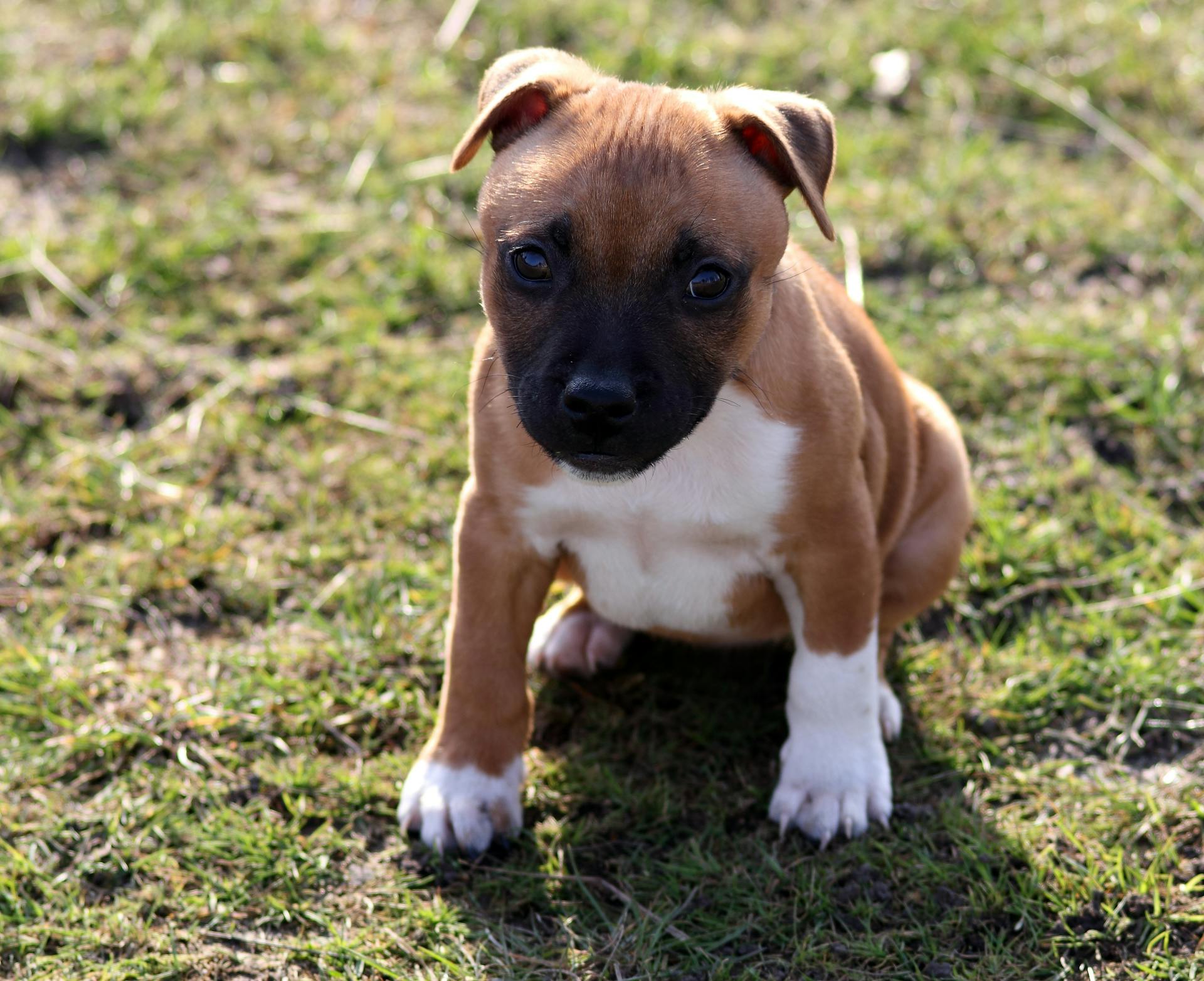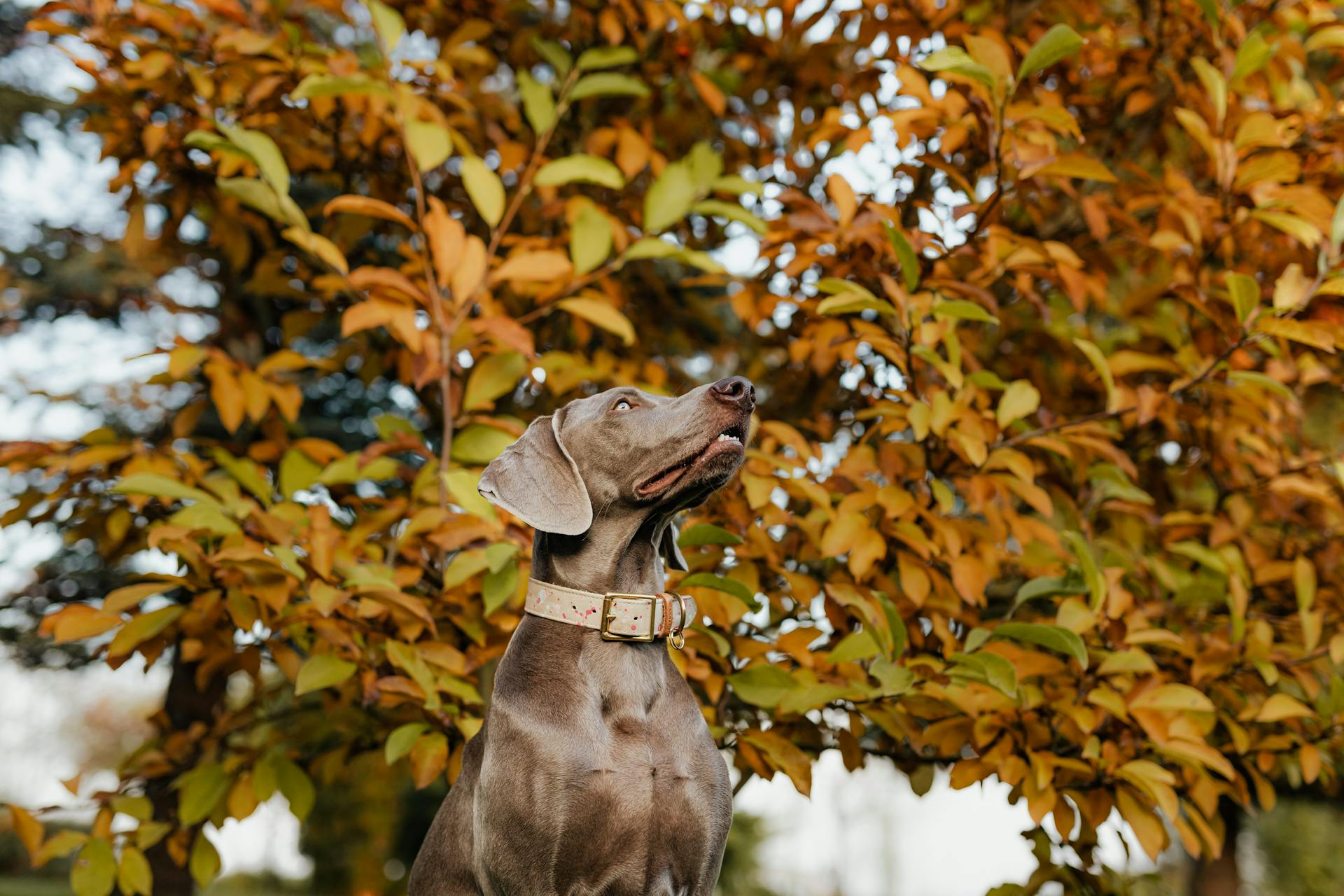
Corgis are often stereotyped as aggressive dogs, but is this reputation justified?
Research suggests that Corgis can be prone to herding behavior, which may be misinterpreted as aggression.
In fact, Corgis are highly social dogs that thrive on interaction with their human family.
However, if left untrained or unsupervised, Corgis may develop destructive behaviors, such as nipping or biting.
Corgis are also known to be wary of strangers, which can sometimes be mistaken for aggression.
Check this out: How to Train Dog Aggression
Understanding Corgi Temperament
Corgis are full of energy and have a strong sense of independence, intelligence, and stubbornness. This can sometimes be misconstrued as aggression.
Corgi enrichment is vital to a well-behaved dog, and there are plenty of ways to enrich their life. This includes providing them with mental and physical stimulation.
Pembroke and Cardigan Welsh Corgis have many subtle differences in terms of temperament. Generally speaking, Pembroke Corgis are more prone to aggressive behavior than their Cardigan counterparts.
Broaden your view: Fluffy Cardigan Corgi
Corgis can become aggressive if they're not properly socialized or if they feel their territory is being threatened. This is often due to their historical role as herding dogs.
Female Corgis are generally more disposed to short tempers and aggressive attacks. They tend to be more territorial and assertive, which can be problematic if not addressed.
Understanding and addressing aggression issues in Corgis is essential. Training should focus on positive reinforcement and developing a strong bond of trust between you and your pet.
Cardigan Welsh Corgis are known for being very loyal and protective of their owners. However, they may be less affectionate than Pembrokes, which you'll need to work on.
Corgis can be prone to barking and nipping, which may be misconstrued as aggression. However, this is often a sign of boredom or lack of stimulation.
Broaden your view: Cockapoo Aggression
Recognizing Aggressive Behavior
Corgis are known to be vocal breeds, and growling is simply one form of their communication. Growling can sometimes indicate aggression, but it can also be a signal of playfulness or excitement.
If your corgi starts snarling, barking, lunging, crouching, or tucking their ears and tail, it's a clear sign that they're feeling uncomfortable or threatened. Remove your dog from the situation to prevent things from escalating.
Some typical signs of aggression in corgis include raised hackles, staring, and lunging. These behaviors can be triggered by a variety of things, such as when your corgi is anxious or frustrated.
Growling does not always mean that a corgi is being aggressive. If the puppy's tail is wagging, they may just be expressing their enthusiasm during playtime.
If your corgi exhibits any of these behaviors, especially around other animals or people, it's essential to take action as soon as possible. This can help prevent more serious issues from arising.
Corgis can act aggressively if they feel frightened or cornered, so it's crucial to recognize the signs of aggression and take steps to address the underlying issue.
Expand your knowledge: American Akita Aggression
Pet Problem Prevention
Corgis can develop behavioral issues, including aggression, due to their strong herding instinct or poor handling techniques.
Training and socialization play a much bigger role in preventing aggression than breed, making it possible for you to influence your puppy's behavior.
Reaching out to a professional trainer is essential when dealing with aggression in your corgi, as they can provide guidance on identifying the source of the aggression and developing a plan to correct it.
Corgis respond well to training because they're highly attentive and very smart dogs, making them more likely to learn and adapt to new behaviors.
Enrolling in dog training classes can help you teach your corgi to look to you for guidance, which can prevent fearful or aggressive behavior in unfamiliar situations.
Ignoring bad behavior, such as yelling or spanking, can actually make the situation worse and encourage your corgi to continue the behavior.
Socialization is key to helping your corgi feel comfortable in different situations, and exposing them to various environments, people, and other animals from a young age can make a big difference.
Here's an interesting read: How to Train Pembroke Welsh Corgi
Obedience training, such as teaching commands like "leave it" or "stay", can help control territorial tendencies and reduce aggressive behavior.
Positive reinforcement techniques, such as using treats, toys, or praise, can help encourage good behavior and discourage bad behavior.
Neutering can also reduce aggression in dogs, making your corgi less territorial and less likely to exhibit aggressive behavior.
Risk Factors and Statistics
Corgis are a purebred dog, which means we can look at what they're bred for and their commonly inherited health conditions to understand their potential risk factors for aggression.
The American Veterinary Medical Association (AVMA) conducted an in-depth review of dog bite data, which found that the more common a breed is, the more often it's connected to bite incidents.
According to the AVMA review, the Pembroke Welsh corgi is the 11th most popular dog breed in America, which should result in a higher number of bites. However, corgis don't appear on any lists that rank dog bite incidents by breed, implying that they have a lower-than-expected risk of biting.
Smaller dogs, like Pomeranians, pugs, and Boston terriers, can behave more aggressively than large dogs, likely due to receiving inconsistent dog training.
Intriguing read: Do Corgis Bite
The Risk Factors
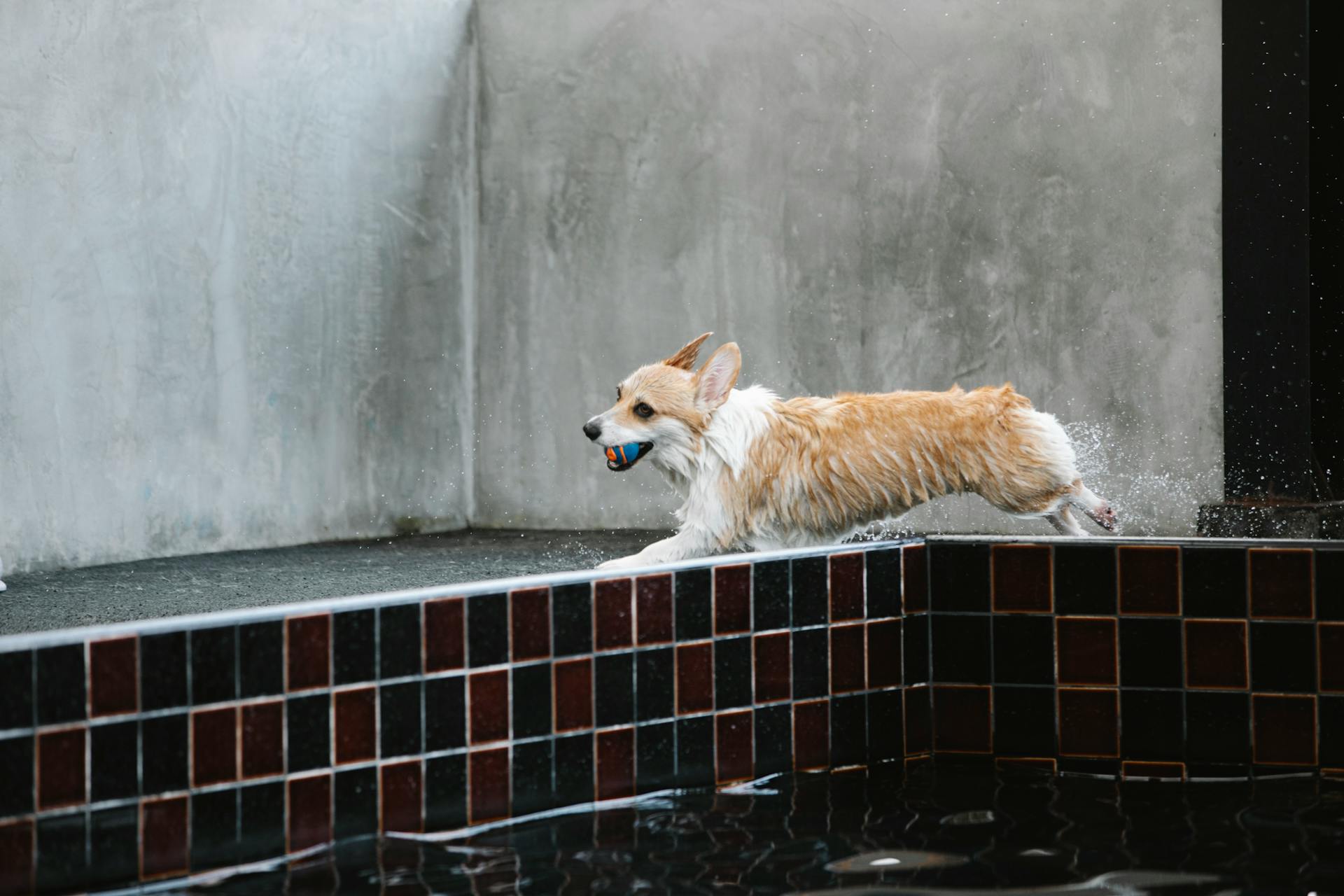
Corgis are a purebred dog, which means their breeding history can play a role in their behavior. They were originally bred for herding, which can sometimes manifest as aggression towards other animals.
Certain medical conditions can also contribute to aggression in individual Corgis. This is why it's essential to monitor their health and address any underlying issues.
Corgis are prone to some inherited health conditions that can affect their behavior. Research has shown that some of these conditions can increase the risk of aggression.
Dog bite data can provide insight into Corgi aggression, but it's essential to remember that individual animals can behave differently.
For your interest: Corgis Health Issues
Dog Bite Data
The American Veterinary Medical Association (AVMA) conducted an in-depth review of dog bite data and concluded that the more common a breed is, the more often it's connected to bite incidents.
This makes sense, as if all dogs are equally likely to bite, and most of the dogs in your community are Labrador retrievers, there's a higher chance of getting bitten by a Labrador retriever.
Discover more: The Dog Corgi
The Pembroke Welsh corgi is the 11th most popular dog breed in America, so based on the same logic, it should have the 11th highest number of bites.
However, the corgi doesn't appear on any lists that rank dog bite incidents by breed, implying that this dog actually has a lower-than-expected risk of biting.
Smaller dogs, like Pomeranians, pugs, and Boston terriers, can behave more aggressively than larger dogs, likely due to inconsistent dog training.
As a large dog with a short stature, a corgi bite can do as much damage as a large dog's bite.
Health and Socialization
Corgis are generally a healthy breed, but they can be prone to certain health issues that may cause aggression if left untreated. These conditions include epilepsy, hypothyroidism, and hip dysplasia.
Cognitive dysfunction, rage syndrome, and epilepsy are common health problems that can lead to aggressive behavior in dogs. Corgis are at a slightly higher risk for epilepsy and hypothyroidism, so it's essential to keep an eye out for any unusual behavior.
If your corgi is suddenly showing signs of aggression, take them to the vet immediately to rule out an underlying medical condition. Pain can also be a contributing factor, as corgis are prone to hip dysplasia and back issues.
A different take: Hip Dysplasia in Corgis
General Health Issues
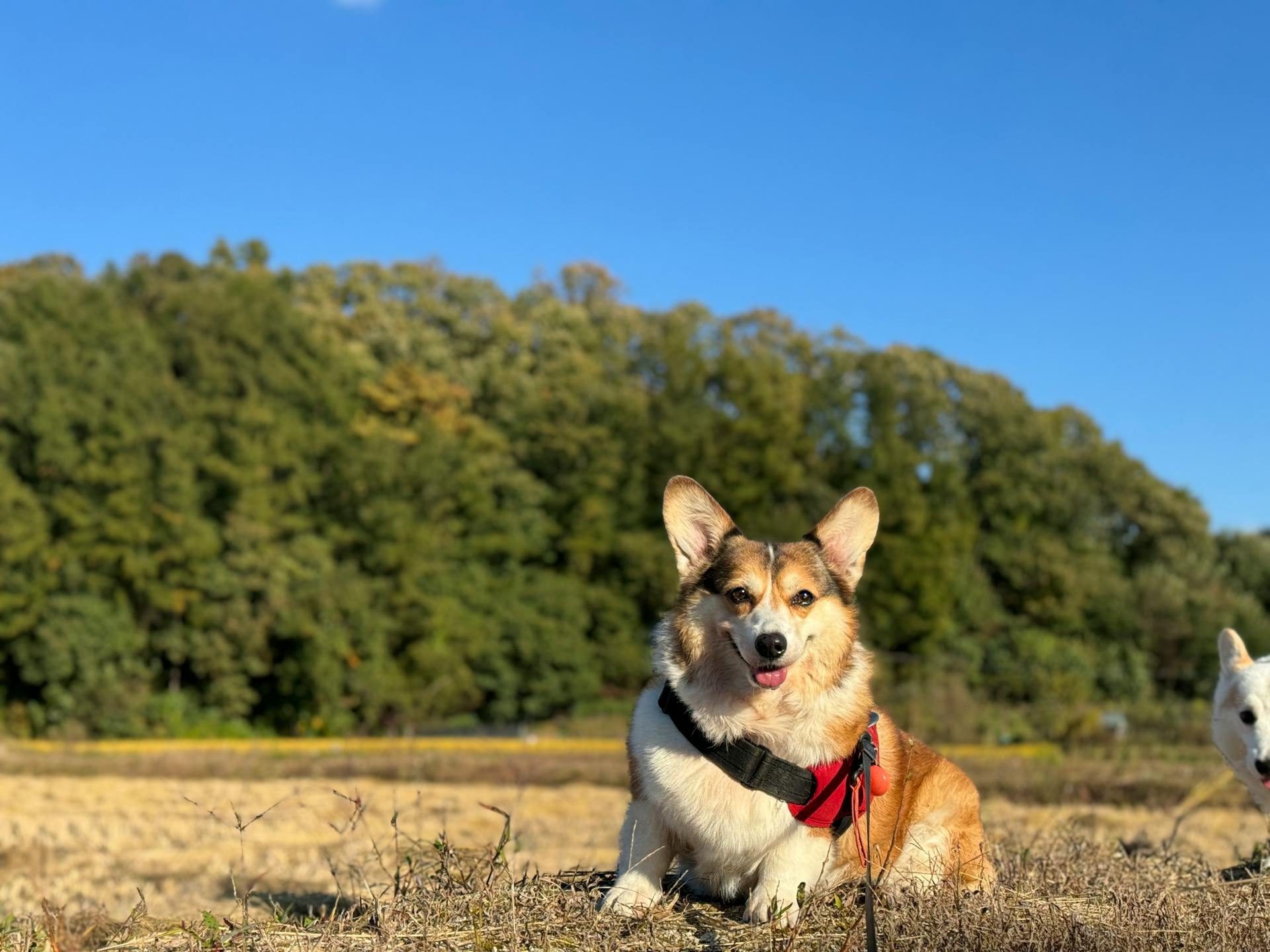
Pain and discomfort are major causes of aggression in dogs, and it's not uncommon for issues like volvulus and back pain from intervertebral disc disease to lead to this behavior.
Corgis, in particular, are prone to hip dysplasia and back issues, which can cause them to act out.
Even if your corgi isn't suffering from epilepsy or hypothyroidism, they may be in pain, making them more likely to exhibit aggressive behavior.
Working with a responsible breeder who runs health screenings on their dogs before breeding can help reduce the risk of health problems in your corgi.
If your typically laid-back corgi suddenly starts showing signs of aggression, take them to the vet immediately to rule out an underlying medical condition.
Expand your knowledge: Do Corgis Have Back Problems
Poor Socialization
Poor socialization can be a major issue with Corgis.
Males tend to be more aggressive than females, especially if they're not neutered. This is because they often take on alpha roles and can be more challenging to handle.

If you're introducing a new pet to your household, it's essential to monitor interactions closely to prevent aggression. Corgis may be friendly with most humans, but they're less trusting of new pets.
This lack of trust can lead to attacks, so it's crucial to socialize your Corgi well and teach them to interact calmly with other animals.
Corgi Behavior and Training
Corgis can be mean, but their aggressive behavior is not always from a negative space. Herding habits like biting and barking may sometimes be mistaken for aggression.
Aggressive behavior in corgis starts around 6 to 14 weeks, so it's essential to start training and socialization around this age.
Identifying the source of aggression in your corgi is crucial, and consulting with a professional trainer can help you determine the cause.
Corgis need at least an hour of physical and mental stimulation each day, and if their needs are not met, they may start acting out in ways that may seem aggressive.
Positive reinforcement techniques, such as rewarding good behavior, are especially effective in correcting your corgi's aggression.
A dog trainer can help you teach your corgi to look to you for guidance, which can help prevent fearful or aggressive behavior in unfamiliar situations.
You can use activities like agility training, fetch, hide-and-seek, or giving them puzzle toys to provide mental and physical stimulation to your corgi.
Addressing Aggression Issues
Aggression in corgis can stem from a variety of factors, including fear, territoriality, or even a lack of socialization. Understanding the root cause of the aggression is crucial to addressing it effectively.
To determine the underlying cause, it's essential to seek guidance from a professional dog trainer or behaviorist who specializes in working with aggressive dogs. They can provide the necessary tools and techniques to train your corgi and manage their aggressive behavior.
Consistency and positive reinforcement are key when training an aggressive corgi. Establishing clear rules and boundaries is also crucial, while rewarding good behavior can help your corgi learn what's expected of them.
Socialization is also crucial, as exposing your corgi to various environments, people, and other animals can help them develop confident and friendly behaviors. With patience, proper training, and socialization, you can effectively handle an aggressive corgi and help them become a well-behaved and balanced companion.
Corgi Biting and Barking
Corgis are known to bite, but it's often a harmless behavior rooted in their herding instincts. This behavior can be mistaken for aggression, leading to poor handling.
Their strong herding instinct can cause them to bite, especially if they feel the need to herd people or other pets. This is why it's essential to understand the reasons behind their biting behavior.
Corgis may bite due to their territorial traits, often aimed at other pets, which is why most vicious Corgi attacks are against other dogs. This is a sign of aggression, but it's not always the case.
Barking is another common aspect of herding behavior in Corgis. They tend to bark at people they feel they have dominance over, including children and strangers.
Their barking can also be a sign of fear, such as regular phobias like loud noises and flashing lights, or anxiety due to meeting strangers. This is why it's crucial to address the root cause of their behavior.
Training and socialization play a significant role in preventing aggression in Corgis. By understanding the reasons behind their behavior, you can take steps to correct it and raise a well-adjusted adult Corgi.
Explore further: Corgi Family Dog
Corgi Temperament and Disposition
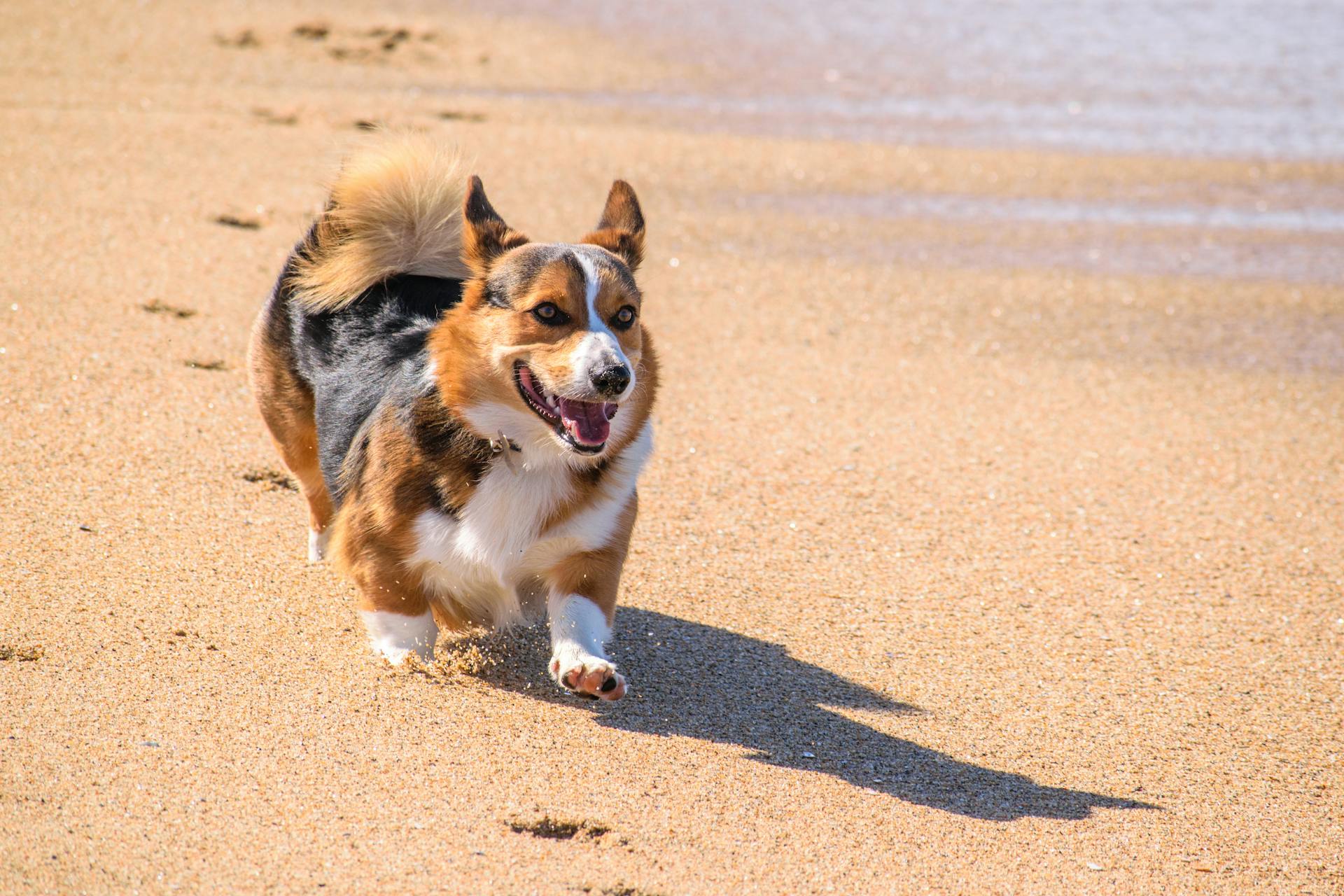
Corgis are full of energy and have a strong sense of independence, intelligence, and stubbornness. This can sometimes be misconstrued for aggression, but it's just their natural behavior.
Breed is a poor indicator of a dog's personality, and even corgi puppies from the same parents can have vastly different personalities. Research suggests that only 9% of a dog's behavioral variations are affected by their breed.
Corgis were originally bred to herd cattle, which requires a tenacious and intelligent dog. This job training can lead to behavioral problems if the dog isn't properly trained.
Corgis have a strong herding instinct, which can cause them to nip heels, especially in households with kids. Training is necessary to prevent this behavior.
Corgis bark a lot, and it's their way of telling the cattle to move, but it can be mistaken for aggression. Training can help reduce barking by showing them that it doesn't get them what they want.

Pembroke Welsh Corgis are generally more prone to aggressive behavior than Cardigan Welsh Corgis. However, they make up for this with their affectionate predisposition.
Cardigan Welsh Corgis are calmer and more even-tempered, making them easier for newbie dog owners to handle. They are loyal and protective of their owners, but may be less affectionate than Pembroke Corgis.
Pembroke Corgis are very social and get along with strangers and other pets, but their strong will and confidence can make them harder to control. They are ideal for seasoned dog owners who can handle their stubbornness.
Cardigan Corgis are less likely to display violent behavior, but may bark or attack if they feel their loved ones are threatened. They are loyal and protective, but may require more work to become affectionate.
If this caught your attention, see: Are Corgis Affectionate
Sources
- Are Corgis Aggressive? Understanding ... (stumpsandrumps.com)
- rage syndrome (msu.edu)
- Pembroke Welsh Corgi’s temperament (wikipedia.org)
- Cardigan Welsh Corgi’s temperament (wikipedia.org)
- Are Corgis Aggressive? The Long-Standing Stereotype (instacorgi.com)
- Are Corgis Aggressive? (thecorgiguru.com)
Featured Images: pexels.com

